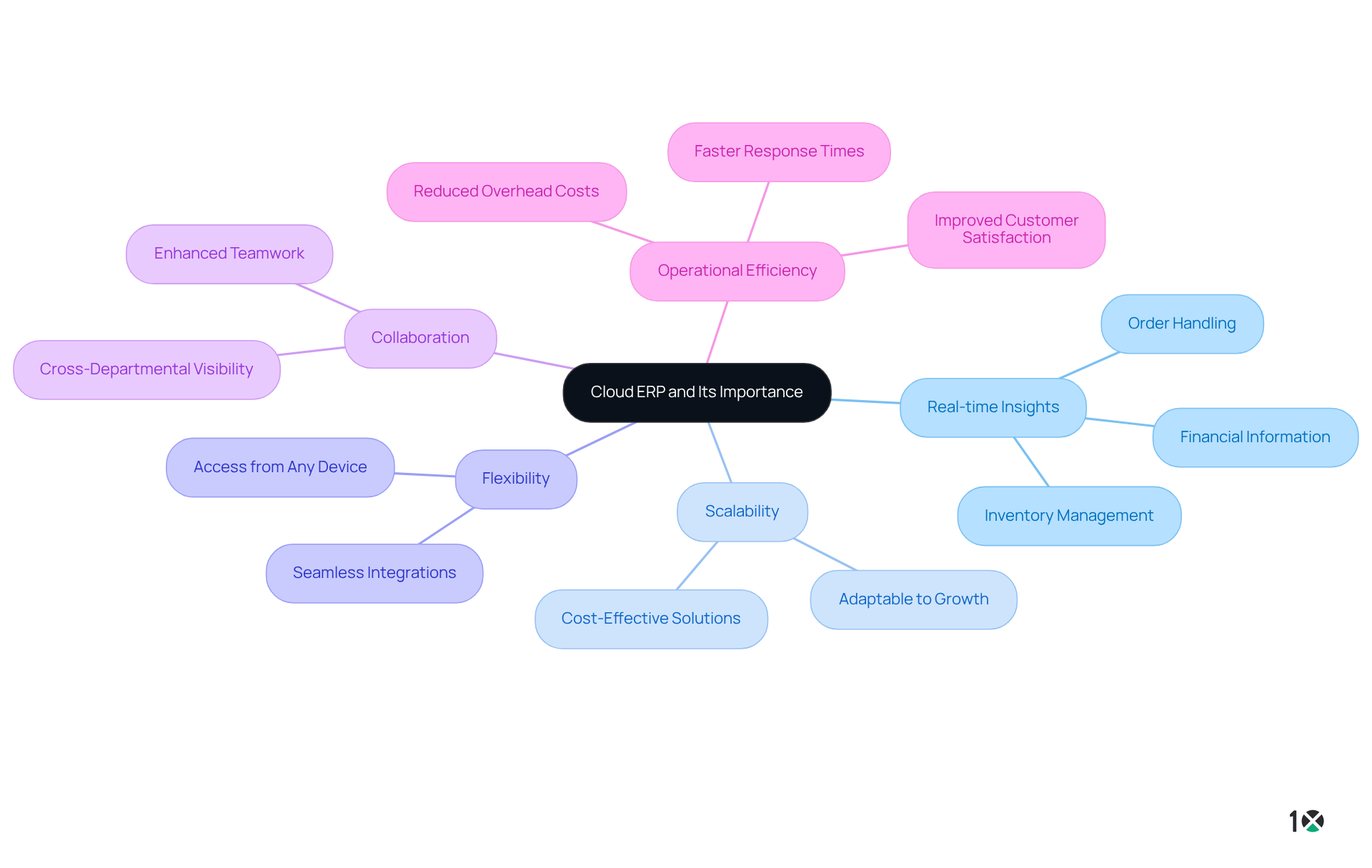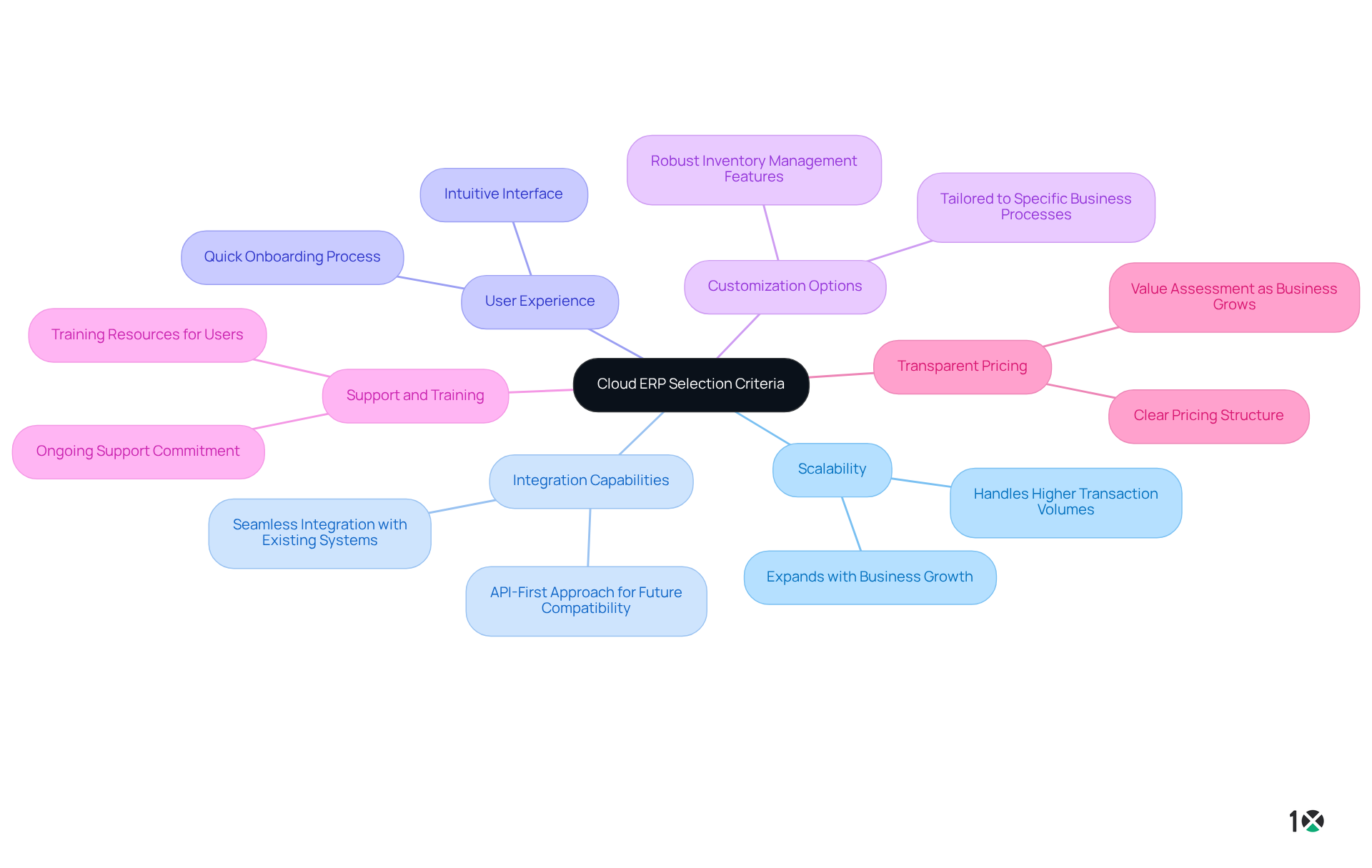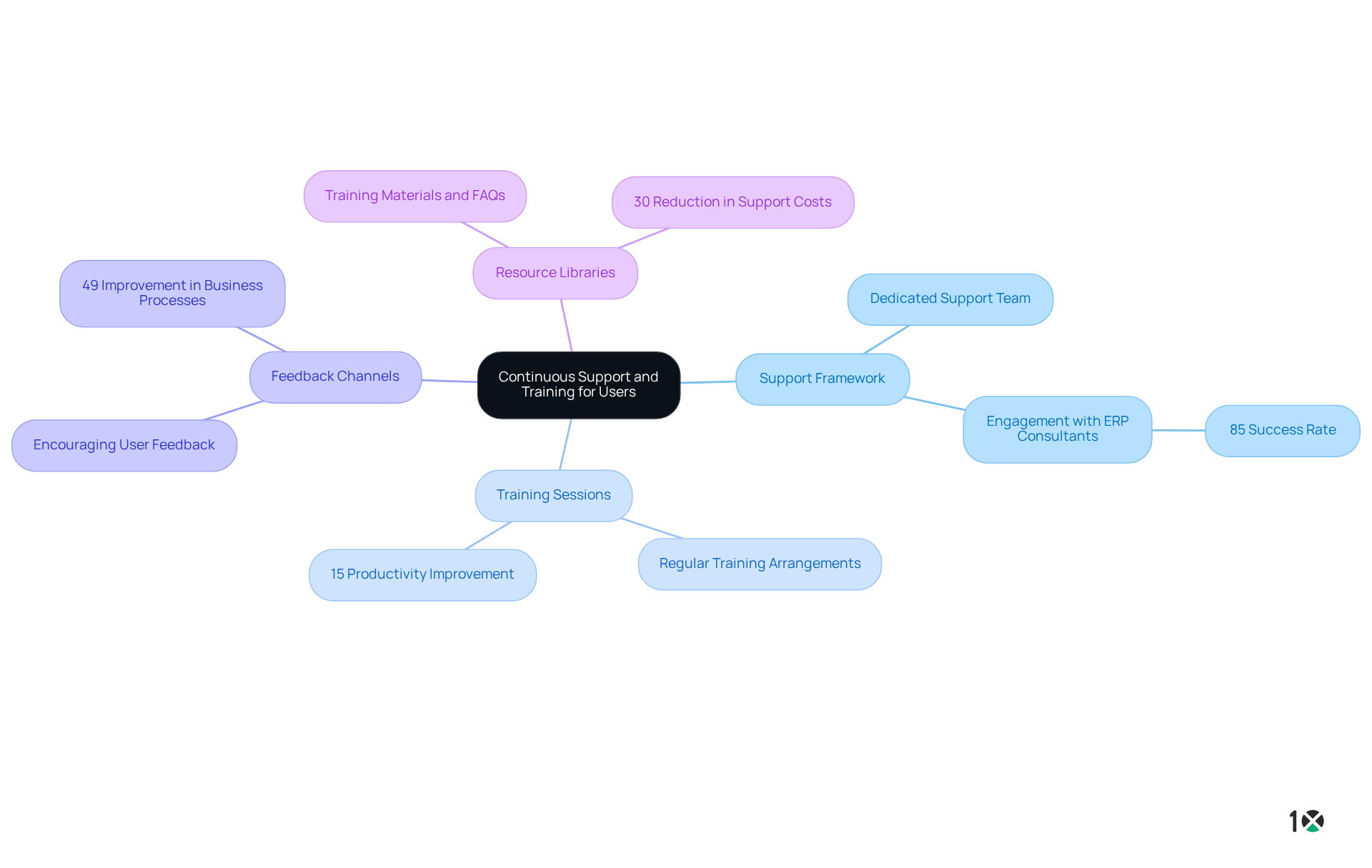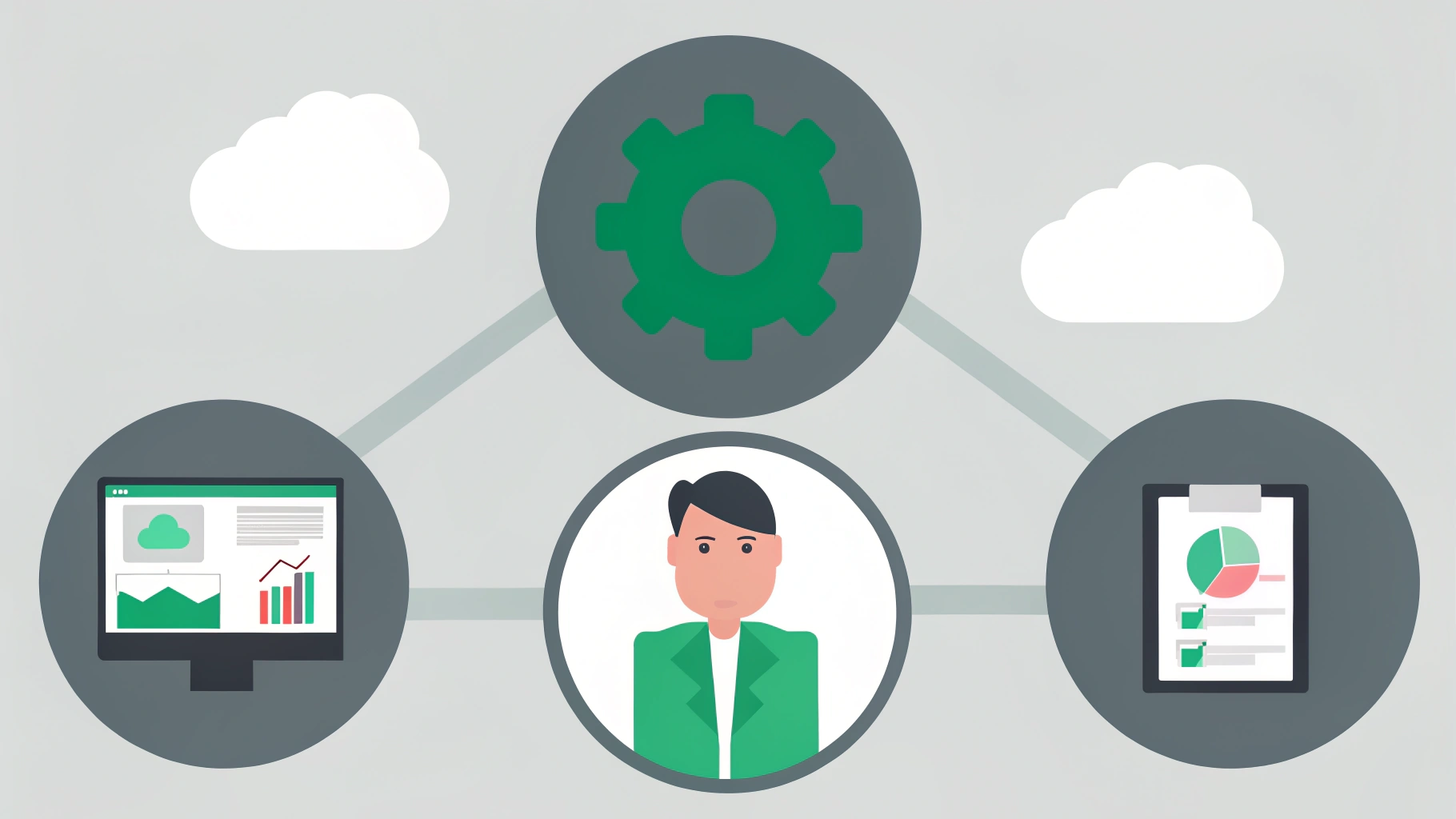Overview
This article examines four pivotal cloud ERP solutions designed to streamline distribution operations. It underscores their significance in boosting efficiency, fostering collaboration, and enhancing data management. By detailing the advantages of cloud ERP—such as real-time insights, scalability, and robust integration capabilities—it empowers distributors to elevate operational performance and enhance customer satisfaction.
The benefits of cloud ERP are not merely theoretical; they provide tangible improvements in day-to-day operations. Real-time insights allow for swift decision-making, while scalability ensures that as a business grows, its ERP system can adapt accordingly. Integration capabilities further enhance the functionality of existing systems, enabling seamless workflows that drive productivity.
In conclusion, embracing cloud ERP solutions is not just a strategic move; it is essential for distributors aiming to thrive in a competitive marketplace. By leveraging these technologies, businesses can not only improve their operational efficiency but also significantly boost customer satisfaction.
Introduction
In the rapidly evolving landscape of distribution, the integration of cloud ERP solutions stands as a pivotal development for businesses aiming for operational efficiency. These platforms centralize vital processes and provide real-time insights that empower decision-makers to respond swiftly to market demands. Yet, with a plethora of options available, how can distributors discern the most effective cloud ERP solutions tailored to their unique needs? This article explores key cloud ERP solutions that streamline distribution operations, offering insights into their benefits, selection criteria, and best practices for implementation.
Understand Cloud ERP and Its Importance for Distribution
Cloud ERP solutions are essential for integrating and managing vital business processes through a centralized, internet-accessible platform. For suppliers, this translates to real-time insights into inventory levels, order handling, and financial information—elements critical for informed decision-making. 10X ERP exemplifies this by providing cloud ERP solutions that guarantee fast, powerful, and responsive access on any device. This capability empowers stakeholders to make better decisions through real-time data processing and built-in reporting.
The importance of cloud ERP solutions is highlighted by their scalability, flexibility, and the enhanced collaboration they foster among teams, regardless of their physical locations. 10X ERP’s comprehensive features, seamless user experience, and transparent pricing structure further simplify the integration process, making it easy for suppliers to recognize the value they receive as they grow. By leveraging cloud ERP solutions, suppliers can streamline operations, reduce overhead costs, and enhance customer satisfaction through faster response times and accurate data management.
For example, companies that have adopted cloud ERP solutions have reported significant improvements in operational efficiency, with some experiencing a 30% increase in their capacity to meet customer demands. Moreover, the integration of real-time analytics with 10X ERP has enabled suppliers to improve inventory management, leading to a reduction in stock discrepancies and enhanced order fulfillment rates. These real-world examples highlight the transformative effects of cloud ERP solutions on distribution operations, emphasizing their role in driving efficiency and improving service delivery. As a partner, 10X ERP also offers lifetime partnership support, ensuring ongoing assistance throughout your ERP journey.

Evaluate Key Criteria for Selecting a Cloud ERP Solution
When evaluating Cloud ERP solutions, distributors must consider several key criteria:
-
Scalability: The solution should expand alongside the business, managing higher transaction volumes and more participants without sacrificing performance. 10X ERP offers scalable solutions that ensure high availability and lightning-fast performance, making it ideal for growing distribution businesses.
-
Integration Capabilities: It is essential to select an ERP that can seamlessly integrate with existing systems and third-party applications. 10X ERP’s API-first approach allows for smooth integration with virtually any software your business utilizes now or in the future, ensuring a cohesive operational environment.
-
User Experience: A user-friendly interface is vital for ensuring quick adoption and minimizing training time. 10X ERP transforms the experience for individuals with its intuitive interface and quick onboarding process, facilitating a smooth start for newcomers.
-
Customization Options: The ability to tailor the ERP to specific business processes can significantly enhance efficiency and user satisfaction. 10X ERP offers customizable tracking and robust inventory management features, enabling suppliers to manage their operations efficiently.
-
Support and Training: Evaluate the vendor’s commitment to providing ongoing support and training resources. 10X ERP prides itself on offering unparalleled customer service and continuous product improvements, ensuring that you are supported throughout your ERP journey.
-
Transparent Pricing: Understanding the pricing structure is crucial for making informed decisions. 10X ERP provides a transparent pricing structure that allows businesses to see the value they are receiving as they grow.
By concentrating on these criteria, suppliers can make informed choices that align with their operational objectives and enhance overall productivity using cloud ERP solutions.

Implement Best Practices for a Smooth Cloud ERP Transition
To ensure a seamless transition to cloud ERP solutions, distributors must follow several best practices that will significantly enhance their implementation success.
- Conduct a Needs Assessment: Begin by identifying specific business requirements and pain points that the new ERP system should address. This initial step is crucial; in fact, 83% of organizations that performed an ROI analysis prior to implementation reported that their projects met ROI expectations.
- Engage Stakeholders Early: It is essential to involve key stakeholders from various departments in the planning process. Engaging stakeholders early not only fosters buy-in but also ensures that their needs are considered. This is critical, as 77% of successful implementers cite internal alignment and leadership support as essential components of their success.
- Develop a Comprehensive Implementation Plan: Create a detailed outline that includes timelines, responsibilities, and milestones to keep the project on track. Given that 64% of ERP projects experience budget overruns, a well-structured plan is vital to mitigate financial risks.
- Test the System Thoroughly: Conduct extensive testing before going live to identify and resolve any issues. This step is vital; 51% of companies experience operational disruption during ERP go-live, making thorough testing indispensable.
- Communicate Changes Clearly: It is imperative to keep all employees informed about the transition process, including training schedules and new workflows. Effective communication can significantly enhance user adoption and minimize resistance to change.
By adhering to these best practices, suppliers can effectively reduce risks and significantly increase the likelihood of a successful implementation of cloud ERP solutions, ultimately resulting in enhanced operational efficiency and productivity.
Ensure Continuous Support and Training for Users
To maximize the effectiveness of cloud ERP solutions, distributors must prioritize continuous support and training for their users.
-
Establish a Support Framework: Form a dedicated support team to assist individuals with any issues they encounter post-implementation. This approach is crucial; organizations that engage ERP consultants report an 85% success rate in their deployments, underscoring the value of expert guidance.
-
Provide Regular Training Sessions: Arrange continuous training sessions to keep participants informed about new features and best practices. Thorough training has been shown to enhance productivity by 15%, illustrating the direct impact of effective training on operational efficiency.
-
Employ Feedback Channels: Motivate individuals to share their thoughts on the ERP system and their training experiences. This feedback loop is essential for recognizing areas for enhancement, as 49% of companies reported improvements in all business processes after implementing ERP systems, emphasizing the significance of participant involvement.
-
Create Resource Libraries: Develop a repository of training materials, FAQs, and troubleshooting guides that individuals can access at any time. Such resources can significantly lower support expenses and system outages, with companies experiencing a 30% decrease in support costs when individuals are well-trained.
By ensuring continuous support and training, distributors can enhance user proficiency with cloud ERP solutions, which leads to improved operational efficiency and overall satisfaction.

Conclusion
Cloud ERP solutions are pivotal in transforming distribution operations by providing a centralized platform that enhances efficiency and decision-making. By integrating real-time data access, these systems empower suppliers to manage inventory, orders, and finances effectively, ultimately leading to improved customer satisfaction and reduced operational costs.
Key aspects such as scalability, integration capabilities, user experience, customization, and ongoing support are critical criteria for selecting the right cloud ERP solution. Furthermore, best practices for successful implementation—including stakeholder engagement and thorough testing—are essential to ensure a smooth transition. The importance of continuous training and support cannot be overstated, as it directly contributes to maximizing the benefits of these systems.
In a landscape where operational efficiency is paramount, embracing cloud ERP solutions is not just a strategic advantage but a necessity for distributors looking to thrive. By following the outlined criteria and best practices, organizations can position themselves for success in an increasingly competitive market. Investing in the right cloud ERP solution today will pave the way for sustainable growth and enhanced service delivery in the future.
Frequently Asked Questions
What is Cloud ERP and why is it important for distribution?
Cloud ERP is a centralized, internet-accessible platform that integrates and manages vital business processes. It is important for distribution as it provides real-time insights into inventory levels, order handling, and financial information, which are critical for informed decision-making.
How does 10X ERP enhance decision-making for suppliers?
10X ERP enhances decision-making for suppliers by providing fast, powerful, and responsive access to real-time data processing and built-in reporting on any device, allowing stakeholders to make better-informed decisions.
What are the key benefits of using cloud ERP solutions?
Key benefits of cloud ERP solutions include scalability, flexibility, enhanced collaboration among teams, streamlined operations, reduced overhead costs, and improved customer satisfaction through faster response times and accurate data management.
Can you provide an example of the impact of cloud ERP on operational efficiency?
Companies that have adopted cloud ERP solutions have reported significant improvements in operational efficiency, with some experiencing a 30% increase in their capacity to meet customer demands.
How does 10X ERP improve inventory management for suppliers?
The integration of real-time analytics with 10X ERP enables suppliers to improve inventory management, leading to a reduction in stock discrepancies and enhanced order fulfillment rates.
What kind of support does 10X ERP offer to its partners?
10X ERP offers lifetime partnership support, ensuring ongoing assistance throughout the ERP journey for its partners.
